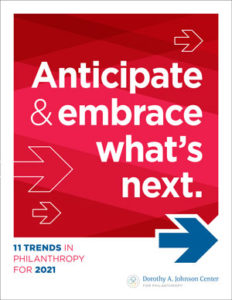Trauma-Informed Philanthropy Builds Community Resilience


 While 2020 may reluctantly be recalled as one of the most traumatic years in history for many individuals, trauma is, unfortunately, not new. A 2015 report from the National Child Traumatic Stress Initiative cites that more than two thirds of children reported at least one traumatic event by age 16 — experiencing a natural disaster, violence, or illness. Sometimes the impact of trauma can be treated, and in some cases prevented, though psycho-social effects of trauma may have long-term individual and intergenerational impact, disproportionately affecting vulnerable communities.
While 2020 may reluctantly be recalled as one of the most traumatic years in history for many individuals, trauma is, unfortunately, not new. A 2015 report from the National Child Traumatic Stress Initiative cites that more than two thirds of children reported at least one traumatic event by age 16 — experiencing a natural disaster, violence, or illness. Sometimes the impact of trauma can be treated, and in some cases prevented, though psycho-social effects of trauma may have long-term individual and intergenerational impact, disproportionately affecting vulnerable communities.
Nonprofit organizations have long provided the space for healing and resilience-building with the trauma-informed care model. The bright side? Foundations are showing up strong in deploying trauma-informed grantmaking, setting in motion cross-sector collaborations and community-centered investments in resilience-building, even before the world-shifting events of 2020.
Perhaps one of the most influential voices on trauma-informed care is philanthropist and media-mogul Oprah Winfrey. In a 2018 interview with CBS This Morning, she noted the philanthropic sector’s approach to helping disenfranchised people is often “working on the wrong thing … unless you fix the trauma …” Winfrey cites the critical need of asking, “What happened to that child?” rather than, “What is wrong with that child?” and leveraging resources in response to the root environment or “hole in the soul.”
The Scattergood Foundation’s Trauma-Informed Philanthropy resource guides equip funders to invest in community resilience models by helping funders to “understand the science behind trauma, adverse childhood experiences, and resilience; apply trauma-informed principles and practices to grantmaking; and learn about existing local efforts to implement trauma-informed practice” (2016, p. 5). The foundation was instrumental in laying the groundwork on trauma-science and the pervasive poor health and social outcomes associated with trauma that often bring people to the doors of nonprofit and human service organizations. Scattergood’s trauma-informed approach to grantmaking emphasizes healing and resilience with policy, systems, and environment in mind. The foundation was one of the first to identify the role of philanthropy in trauma-informed practice, and in its 2018 report noted, “Philanthropic organizations can play a significant role in building cross-sector networks through three key functions: providing funding, championing the cause, and fostering collaboration” (Scattergood, p. 31).
“Foundations are showing up strong in deploying trauma-informed grantmaking, setting in motion cross-sector collaborations and community-centered investments in resilience-building even before the world-shifting events of 2020.”
In Virginia, trauma-informed programs and practices are emerging with support from organizations like the Family and Children’s Trust Fund, a public-private partnership whose focus shifted in recent years to support direct-service organizations and system-wide trauma-informed care approaches (2018). This includes support for Greater Richmond Stop Child Abuse Now (SCAN) and the 2012-formed collaborative of more than 160 organizations committed to trauma-informed-practice region — the Greater Richmond Trauma-Informed Community Network of Virginia (SCAN, 2020).
Collaboration is the gold standard at the community level. One example is Scaling Wellness in Milwaukee (SWIM), a trauma-informed incubator space for community-based organizations in development in Wisconsin. The hub for at least nine organizations addressing generational trauma in the city will be a convening space for partner organizations, events, trauma and resilience training, and provide access to resources including grant writing, accounting or legal services (Anderson, 2020). Established in 2018, SWIM is in the process of building its collective impact space after increased community attention to trauma.
In September 2020, the Minneapolis Foundation’s Fund for Safe Communities awarded grants totaling more than $500,000 to 40 community-based groups to “provide wellness and trauma-informed health services, promote public dialogue to change narratives and advance possible policy solutions to violence” after George Floyd’s death — and the resounding call for racial justice in Minnesota’s Twin Cities (Carlos, 2020, para. 2). Ranging from a solutions-based journalism project with Minnesota Women’s Press, to restorative justice training at the Minnesota Peacebuilding Leadership Institute, and reimagining public safety initiatives at Jewish Community Action — the foundation’s Fund for Safe Communities had a timely and critical response to the community’s collective trauma.
From foundation capacity building and community collaborations, trauma-informed programs are moving in a strong direction at the community level. Where foundations may lean in is investing in both community-level care and staff-care, as burnout and secondary-trauma are heightened for individuals on the front lines of public health and social movements (Mock, 2020). An additional opportunity for trauma-informed philanthropy is in the continued study of trauma and its disproportionate impact on vulnerable populations. Social scientists have their work cut out for them addressing the trauma exacerbated by the tidal wave of 2020 and the indefinite undercurrents to come, and the grantmaking community has a major role in proactively championing this critical work.
Anderson, L. (2020, September 25). Scaling wellness in Milwaukee plans nonprofit hub on city’s near west side. BizTimes. https://biztimes.com/scaling-wellness-in-milwaukee-plans-nonprofit-hub-on-citys-near-west-side
Carlos, I. (2020, September). Minneapolis Foundation awards $500K+ in grants to 40 community groups. Minneapolis/St. Paul Business Journal. https://www.bizjournals.com/twincities/news/2020/09/29/minneapolis-foundation-awards-500k-grants.html
CBS This Morning. (2018, March 6). Helping ease childhood trauma [Video]. YouTube. https://youtu.be/gqu54ZlhINc
Family & Children’s Trust Fund of Virginia. (2018, July 11). FACT grants span across Virginia to support trauma-informed care [Blog]. Virginia.gov. http://www.fact.virginia.gov/blog
Mock, J. (2020, June 1). Psychological trauma is the next crisis for coronavirus health workers. Scientific American. https://www.scientificamerican.com/article/psychological-trauma-is-the-next-crisis-for-coronavirus-health-workers1
National Child Traumatic Stress Initiative. (2015). Understanding child trauma. SAMSA. https://www.samhsa.gov/sites/default/files/programs_campaigns/nctsi/nctsi-infographic-full.pdf
SCAN. (2020). What is the GRTICN? http://grscan.com/trauma-informed-community-network
Scattergood Behavioral Health Foundation, United Way of Greater Philadelphia and Southern New Jersey, & Philanthropy Network Greater Philadelphia. (2016). Trauma-informed philanthropy (Vol. 1). Thomas Scattergood Foundation. https://philanthropynetwork.org/sites/default/files/TraumaGUIDE_Final.pdf
Scattergood Behavioral Health Foundation, United Way of Greater Philadelphia and Southern New Jersey, & Philanthropy Network Greater Philadelphia. (2018). Trauma-informed philanthropy (Vol. 2). Thomas Scattergood Foundation. https://philanthropynetwork.org/sites/default/files/Trauma2-web%20%281%29.pdf